If you’re interested in mining Ethereum, you’re in the right place. By following this guide, you’ll learn everything you need to know about Ethereum mining.
So where does all of this mining take place and where does the Ether come from? Well, your computer is solving math problems to make sure no one makes transactions on the Ethereum network that aren’t true. If your computer manages to solve the problem, you get rewarded. And that is called mining. Everyone has an opportunity to help solve these problems and claim rewards.
What’s crucial to understand, though, is that Ethereum mining is not such a simple process, so if you decide to buy this cryptocurrency instead and start trading, you should check out the most recommended crypto trading platforms.
Short Ethereum mining explanation
The Ethereum network has its own blockchain. All transactions that are made using Ethereum need to get approved by the miners. That’s why it takes a while before the Ether you send someone reaches them. The transaction has to be verified and put inside the Ethereum blockchain. This verification process is called proof of work. It is your job as a miner to make sure no one cheats.
To make sure that the transactions are valid miners are solving complex mathematical equations. When a miner solves this equation, he communicates this to all of the other miners “Hey, I’ve got it! I have found the number we’ve been looking for all this time” using fancy computer language.
All of the other miners check if this number is correct and if 51% of them agree that it’s correct a new block gets added to the blockchain. This new block contains all of the transactions that are now verified and the miner who found the number is rewarded! The miners then start solving a new math problem to verify another block of transactions.
Three ways to mine Ethereum
Ok, now that we have that out of the way how do you start mining Ethereum? There are three ways you can mine.
- Pool mining (Recommended)
- Mining alone (Not recommended)
- Using Cloud mining services (Not Recommended)
Pool Mining
Ethereum mining in a pool is the easiest and fastest way to get started. You work together with other people. All of the people that are mining within a single pool agree that if one of them finds the secret number, they’ll share rewards with everyone. How often you find blocks and share rewards depends on the pool size. However, not all pools are the same. These are the things that you should consider before joining a pool.
- Pool size
- Minimum Payout
- Pool fee
Why is cryptocurrency mining pool size important? Well, the short answer is that as the number of people that mine increases, the chances of getting rewards also increase. However, as more people join the pool, the rewards are getting shared between more people.
You should try out different pools before you find the one that best works for your computer. Joining big cryptocurrency mining pools is usually a safer choice. You might be getting fewer rewards per 1 block, but at least you won’t go a day or a week without getting a reward at all.
You should look at the minimum payout as well. A minimum payout is the smallest amount of Ether you will need to mine before it gets sent to your wallet. If the minimum payout is 1 ETH, you will need to stay in the same pool for a long time before getting your cryptocurrency.
Pools with large minimum payouts are not beneficial to you. You should try to find pools with a small minimum payout. You want to be getting paid as frequently as possible, without having to commit your time to a single mining pool for too long. Having the flexibility to switch between different cryptocurrency mining pools is essential!
Every pool has a fee associated with it. You have to pay a small amount so that you could continue using the pool. This amount gets paid automatically, so you don’t need to worry about it. The payments are % based and are calculated in the cryptocurrency you’re mining. The amount you have to pay usually differs from 1% to 3%. You should look for a pool with around 1% fee as these are far more reliable than 0% fee pools.
Running a mining pool is a full-time job and computing and data center space isn’t cheap. 0% fee pools are usually supported by donations, they might be less stable than pools with a fee to cover the costs. If the pool fee is higher than 3%, you should consider looking for another pool.
Mining Alone
Mining alone might seem like a great idea. You don’t have to share any rewards. You just turn your computer on and let the money roll in, right? Wrong. When you’re doing Ethereum mining alone, you are competing with other people and will only get rewards if you solve the math puzzle first. Since you’re competing with a very large network of people and companies that have a lot of resources, you would need to get very lucky very often. Mining alone is only profitable if you have a lot of resources at your disposal, we’re talking 100+ graphics cards. Having this much computing power has its disadvantages. You would need to worry about:
- Heating problems. If your equipment gets too hot, it could break. Once your equipment breaks, it’s usually not worth it to repair it. You would need to spend more money to replace your mining rig and fix the heating issues.
- Ventilation. To keep everything working correctly, you would need to have a lot of fans moving air very quickly. As I’ve mentioned above, heating is a real problem.
- Noise. All the fans that are spinning and cooling down your equipment would make a lot of noise. It would get very loud, very fast. Usually, you need something like a garage/warehouse or a remote location to keep everything.
- Electricity costs. Having so much equipment use power at the same time would use up a lot of electricity. For example, with only ten graphics cards you would spend around 3-4 dollars on electricity per day. Imagine ramping up to 100 cards to stay competitive. The cost to power them all would add up to 30-40 dollars per day in electricity costs alone.
- Space. Having a place to store 100+ Ethereum mining rigs isn’t something that’s available to most people.
Cloud Mining
When you are using cloud mining, you are paying someone else to mine for you. The way this works is that you’re renting mining time from other people and in return, they give you all the rewards they can mine. Cryptocurrency cloud mining might seem a bit dumb.
- Why would someone use their equipment to mine for you when they can mine for themselves?
- Why would you pay someone else to mine for you when you can invest the money in equipment and mine yourself
- Why don’t you spend the money on buying the cryptocurrency you want instead of paying someone to mine it?
And all these are valid questions. It’s not better or worse than doing all the work yourself. Let’s analyze the benefits and hazards of Ethereum cloud mining.
Pros:
- You are not responsible for any equipment that breaks. Once you pay someone to mine for you, you’re buying a certain amount of work that has to be done. And all of the repair costs are not your responsibility. However, be careful, some companies will make you pay for electricity and repair costs. Read the contracts carefully and avoid this!
- You don’t have to keep a significant amount of noisy equipment in your home or warehouse.
Cons:
- You pay the money up-front if Ethereum price drops, you won’t have a chance to get your money back. And you’re stuck with the mining work you bought.
- You can’t change the mining software and hardware that the cloud mining provider uses.
Cloud mining is a safe way for mining providers to guarantee themselves profit for the equipment they’ve purchased. Cryptocurrency price doesn’t affect them because you pay them in advance. So, when you buy cloud mining services, you don’t have to deal with any troubles that come with making your ethereum mining rig. In an ideal situation, cloud mining is less profitable than mining yourself. Instead of using cloud mining services you can also just buy ethereum.
Personal opinion: For the time being, try to stay away from cloud mining services. If you wish to invest in cloud mining services, just use the money to buy your desired cryptocurrency instead. You will get your rewards right away and if something goes wrong you will have the ability to sell your cryptocurrency.
How to pool mine Ethereum: Tutorial
So your computer is going to be used to mine Ethereum. Let us go over the tools your computer needs to be an efficient miner. Here’s everything you will need to be a successful Ethereum miner:
- An Ethereum wallet to hold all of your newly found currency;
- GPU drivers;
- A mining application (Claymore miner);
- A mining pool address if you’re going to mine within a mining pool;
- A graphics card (GPU) with at least 3gb of RAM;
- A compatible operating system (Windows 7 or 10 64bit ).
Create a digital wallet
Before starting Ethereum mining, you will need to create a digital wallet. You have a wallet in real life for your physical money.
Cryptocurrency works the same way. You will want to create a digital wallet where you can keep your Ether.
Installing your graphics card drivers
When your digital wallet is set and ready, it’s time to update the software on your computer. The mining process will be more profitable if your hardware is running all of the latest updates. So update your drivers now.
For AMD Graphics Card users
If you have an AMD graphics card, you can download the latest drivers for your card right here.
Use these if you plan to do other things with your computer, like work or gaming.
Or here.
Use these if you plan to use your computer for Ethereum mining only. These are optimized for mining and only mining. Meaning, you won’t be able to do much more with your computer.
For Nvidia Graphics Card users
If you have an Nvidia graphics card, you can download the latest drivers for your card right here.
Download and install the drivers based on what graphics card you are using.
Installing Ethereum mining software
-
- Go to https://bitcointalk.org/index.php?topic=1433925.0
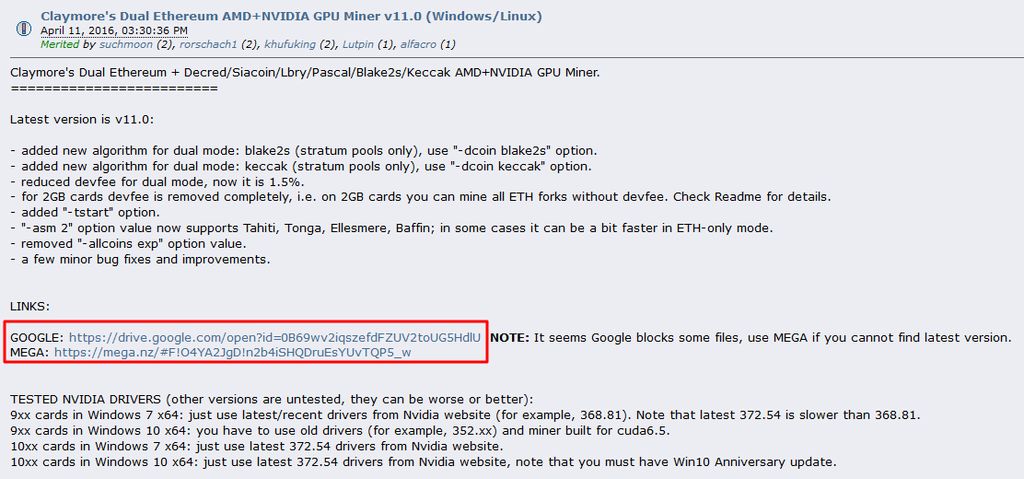
2. Download the latest version of Claymore dual miner. By clicking one of the highlighted links. As of today, the newest version is 11.0. This tutorial used the 2nd link from Megaupload.
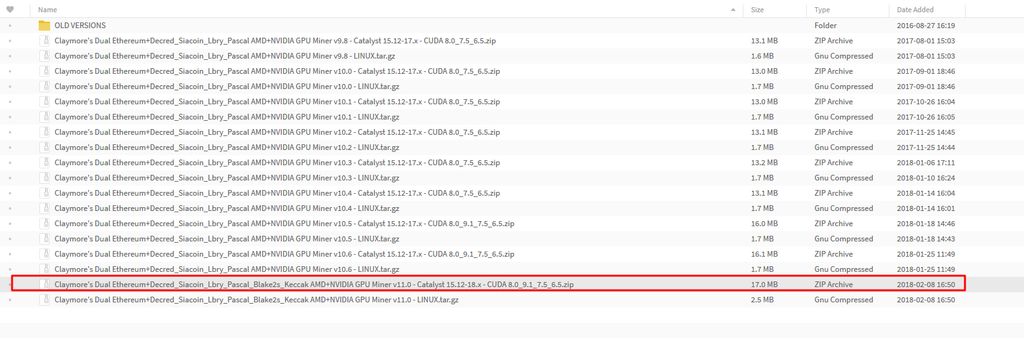
3. Click the latest version for windows. Then click on the download as a zip button. Wait for the download to finish. Save the file to your desktop for easy access.

4.Extract Claymore v11.0 files to a folder on your Desktop for easy access.
5. Open the folder you’ve just extracted to view the files, it should look like this.
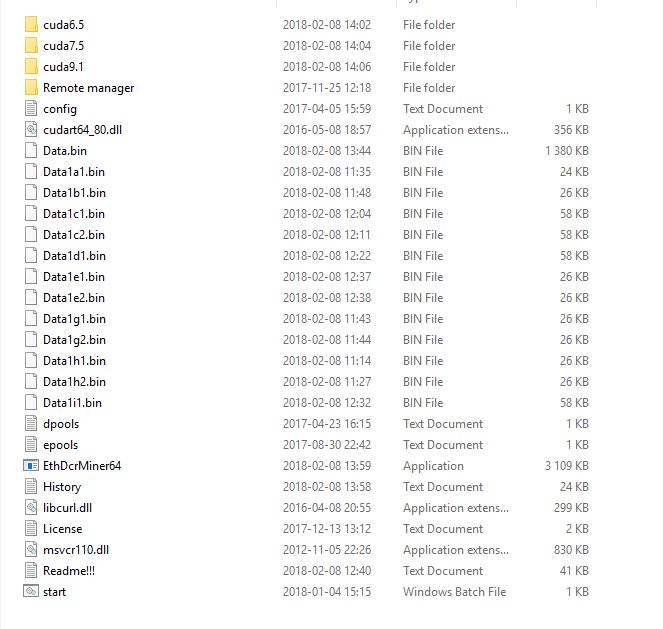
6. Right click on start
7. Click Edit

8. Edit the Start.txt file and insert the following lines:
setx GPU_FORCE_64BIT_PTR 0
setx GPU_MAX_HEAP_SIZE 100
setx GPU_USE_SYNC_OBJECTS 1
setx GPU_MAX_ALLOC_PERCENT 100
setx GPU_SINGLE_ALLOC_PERCENT 100
EthDcrMiner64.exe -epool -ewal -epsw x
Choose your pool from one of these recommended Ethereum mining pools.
Note: these pool addresses are for the Europe region. If you live in the US or Asia you might get better results using addresses that are closer to your region. Visit the pool site and find out if the pool supports your region.
Instead of < Mining_Pool_Address> type in your pool address.
Instead of type in your wallet address:
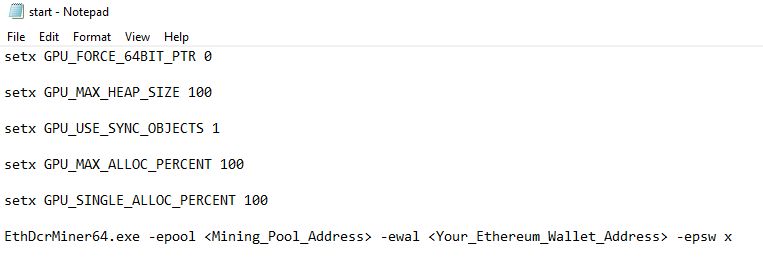
Once you’re done it should look like this:

DO NOT COPY THE WALLET ADDRESS YOU SEE IN THE PICTURE, USE YOUR OWN. IF YOU COPY THIS WALLET ADDRESS ALL OF THE ETHER YOU MINE WILL GO TO US, NOT YOU. IF YOU’RE USING MYETHERWALLET YOU CAN FIND YOUR WALLET ADDRESS BY GOING TO https://www.myetherwallet.com/ AND CHECKING UNDER ACCOUNT ADDRESS

9. Save Start.txt with your new values by going to file -> save as
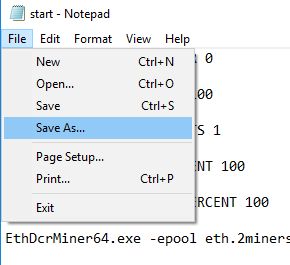
10. Change the file name to start.bat

11. For saving as type: choose All Files
12. Click save and click Yes, when asked if you want to replace the file
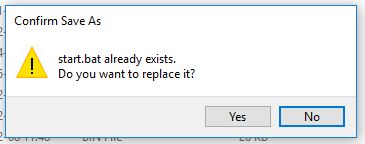
13. Double-click Start.bat to begin mining

14. If you’ve followed the steps above you should see this screen.

That’s it! Your computer is now mining Ethereum. Leave this screen open.
How to check how much you’ve mined?
Every pool has a different interface but the principle stays the same. You’ll need to go to your pool’s website and type in your public wallet address. Let us use the 2miners pool as an example.
You type your public wallet address in the search bar and you’ll be able to see all of the information about your Ethereum mining efforts. In the case of a 2miners pool once your balance reaches 0.01 ETH it will get sent to your wallet address that you’ve typed into the start.bat file earlier.

How to calculate profits
- Open up your miner and check how many Megahashes per second your hardware is submitting (Mh/s)
- We can see that our one GTX 1070 GPU was getting 32.2Mh/s.
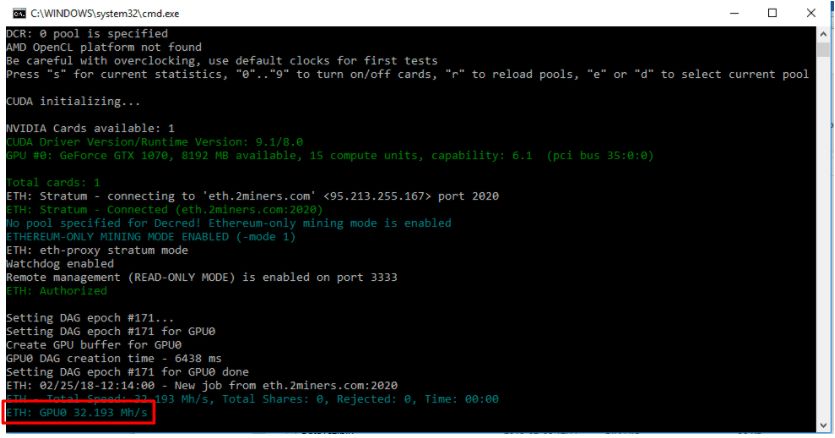
- Open the mining calculator available here.
- Type in your Mh/s, the cost of electricity and power consumption. You’ll get average results based on how much 1 ETH is at the time.
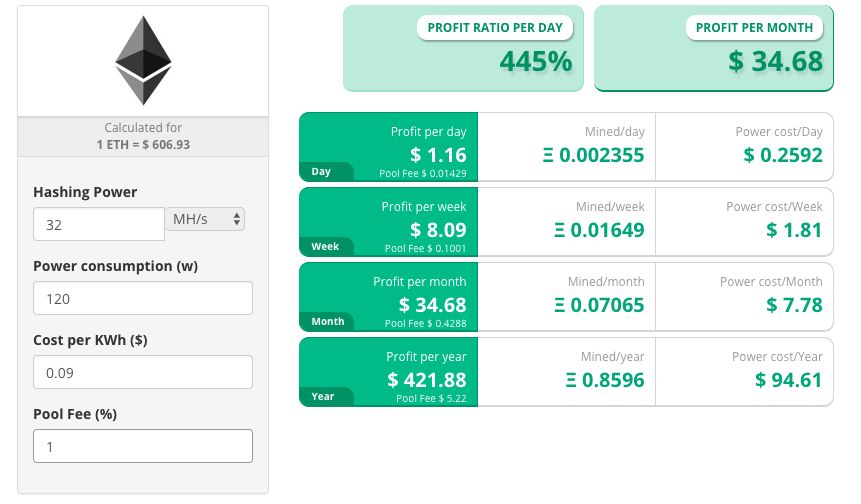
Tips and tricks
- If you plan to leave your computer mining for long periods of time here’s a couple of things you might want to do to avoid any downtime.
- Computer power settings: By default, if your computer stays idle for a long period of time it will “go to sleep”. Once your computer goes to sleep it will stop mining. To avoid this, go to your power settings and make sure your computer never sleeps.
Now your computer can mine all day long without going to sleep.



